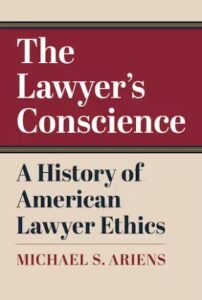Michael Ariens—Law School Class of ’82—Is a Deep and Deft Thinker
This is the first in a series of three blog posts this week by Marquette law faculty on a new book.
 Over a distinguished career Professor Michael S. Ariens of St. Mary’s University has made rich contributions to the scholarship devoted to American constitutional law, legal history, his adoptive home state of Texas, navigating the challenges of law school, and, central for our purposes, the practice of law and the American legal profession.
Over a distinguished career Professor Michael S. Ariens of St. Mary’s University has made rich contributions to the scholarship devoted to American constitutional law, legal history, his adoptive home state of Texas, navigating the challenges of law school, and, central for our purposes, the practice of law and the American legal profession.
Professor Ariens’s new volume—The Lawyer’s Conscience: A History of American Legal Ethics (University Press of Kansas 2022)—continues a theme that animates much of his recent scholarship. Put succinctly, that theme is this: The American legal profession has veered off course. It has done so, according to Ariens, in a host of ways. Among them, he contends, are these:
- Commitment to clients has supplanted commitment to the public good.
- The pursuit of profit-maximization has transformed the enterprise from a profession into a business.
- The day-to-day touchstones of (first) honor and (then) conscience that impelled lawyers up through the middle of the twentieth century have melted away, replaced for the typical lawyer by an impoverished set of minimum standards of conduct promulgated by the American Bar Association in the early 1980s.
- Independence from client interests—independence that enabled lawyers and their firms to both be and be perceived as being separate from those client interests—has been supplanted by a sort of shotgun marriage that leaves today’s law firms unable or unwilling to maintain appropriate distance from client interests.
- A profession whose members once shared a common vision of what it means to be a lawyer and found ways to speak in something of a unified voice has “fractured,” creating the sorts of factions James Madison described in Federalist 10. Such fracture, Ariens submits, has dissolved this once-unified vision and rendered it virtually impossible to achieve meaningful consensus on principles that matter.

